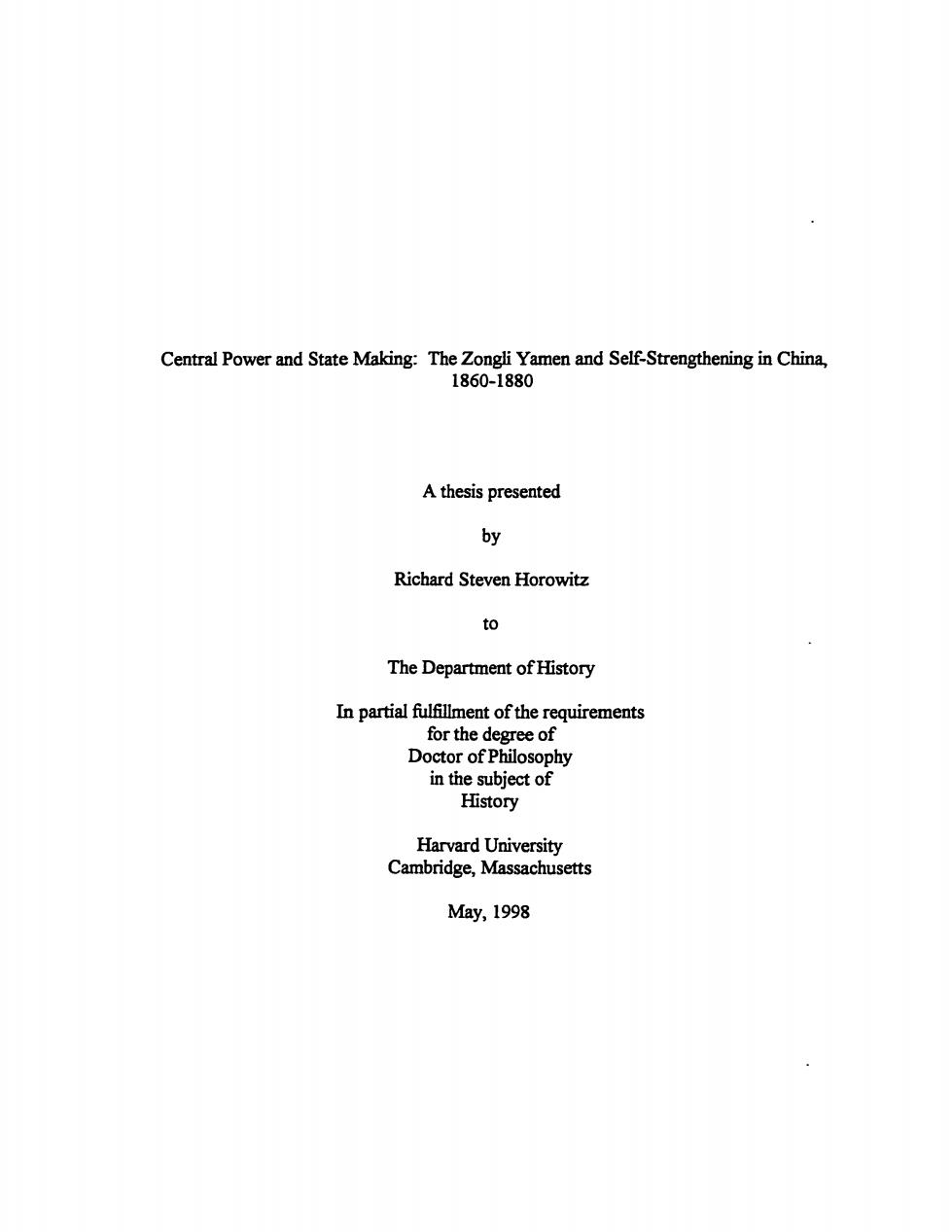
Central Power and State Making:The Zongli Yamen and Self-Strengthening in China, 1860-1880 A thesis presented by Richard Steven Horowitz to The Department of History In partial fulfillment of the requirements for the degree of Doctor of Philosophy in the subject of History Harvard University Cambridge,Massachusetts May,1998
Central Power and State Making: The Zongli Yarnen and Self-Strengthening in China, 1860-1880 A thesis presented by Richard Steven Horowitz to The Department of History In partial fulfillment of the requirements for the degree of Doctor of Philosophy in the subject of History Harvard University Cambridge, Massachusetts May, 1998
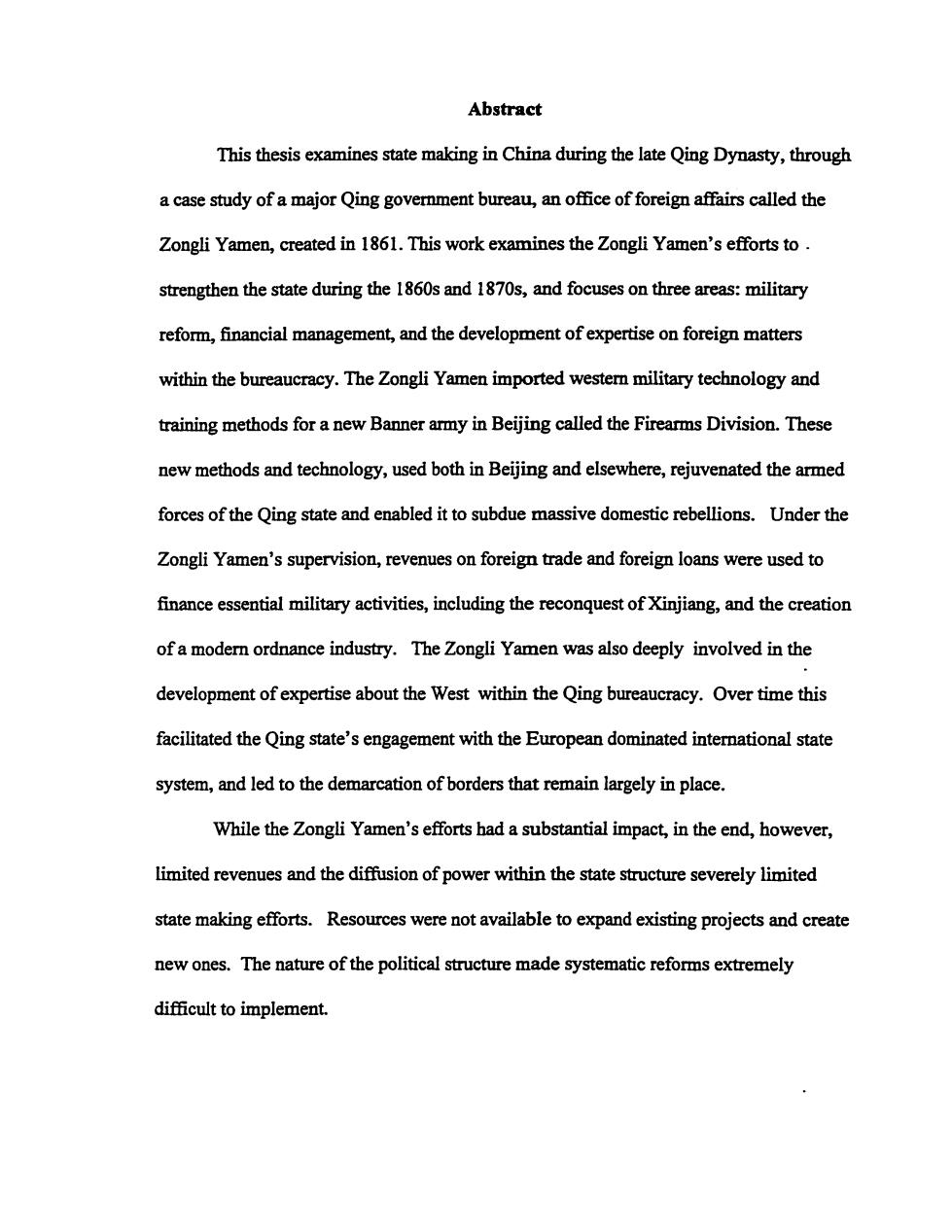
Abstract This thesis examines state making in China during the late Qing Dynasty,through a case study of a major Qing government bureau,an office of foreign affairs called the Zongli Yamen,created in 1861.This work examines the Zongli Yamen's efforts to. strengthen the state during the 1860s and 1870s,and focuses on three areas:military reform,financial management,and the development of expertise on foreign matters within the bureaucracy.The Zongli Yamen imported westem military technology and training methods for a new Banner army in Beijing called the Firearms Division.These new methods and technology,used both in Beijing and elsewhere,rejuvenated the armed forces of the Qing state and enabled it to subdue massive domestic rebellions.Under the Zongli Yamen's supervision,revenues on foreign trade and foreign loans were used to finance essential military activities,including the reconquest of Xinjiang,and the creation of a modern ordnance industry.The Zongli Yamen was also deeply involved in the development of expertise about the West within the Qing bureaucracy.Over time this facilitated the Qing state's engagement with the European dominated international state system,and led to the demarcation of borders that remain largely in place While the Zongli Yamen's efforts had a substantial impact,in the end,however, limited revenues and the diffusion of power within the state structure severely limited state making efforts.Resources were not available to expand existing projects and create new ones.The nature of the political structure made systematic reforms extremely difficult to implement
Abstract This thesis examines state making in China during the late Qing Dynasty, through a case study of a major Qing government bureau, an office of foreign affairs called the Zongli Yamen, created in 1861. This work examines the Zongli Yamen's efforts to . strengthen the state during the 1860s and 1870s, and focuses on three areas: military reform, financial management, and the development of expertise on foreign matters within the bureaucracy. The Zongli Yamen imported western military technology and training methods for a new Banner army in Beijing called the Firearms Division. These new methods and technology, used both in Beijing and elsewhere, rejuvenated the armed forces of the Qing state and enabled it to subdue massive domestic rebellions. Under the Zongli Yamen's supervision, revenues on foreign trade and foreign loans were used to finance essential military activities, including the reconquest of Xinjiang, and the creation ofa modem ordnance industry. The Zongli Yamen was also deeply involved in the development of expertise about the West within the Qing bureaucracy. Over time this facilitated the Qing state's engagement with the European dominated international state system, and led to the demarcation of borders that remain largely in place. While the Zongli Yamen's efforts had a substantial impact, in the end, however, limited revenues and the diffusion of power within the state structure severely limited state making efforts. Resources were not available to expand existing projects and create new ones. The nature of the political structure made systematic reforms extremely difficult to implement
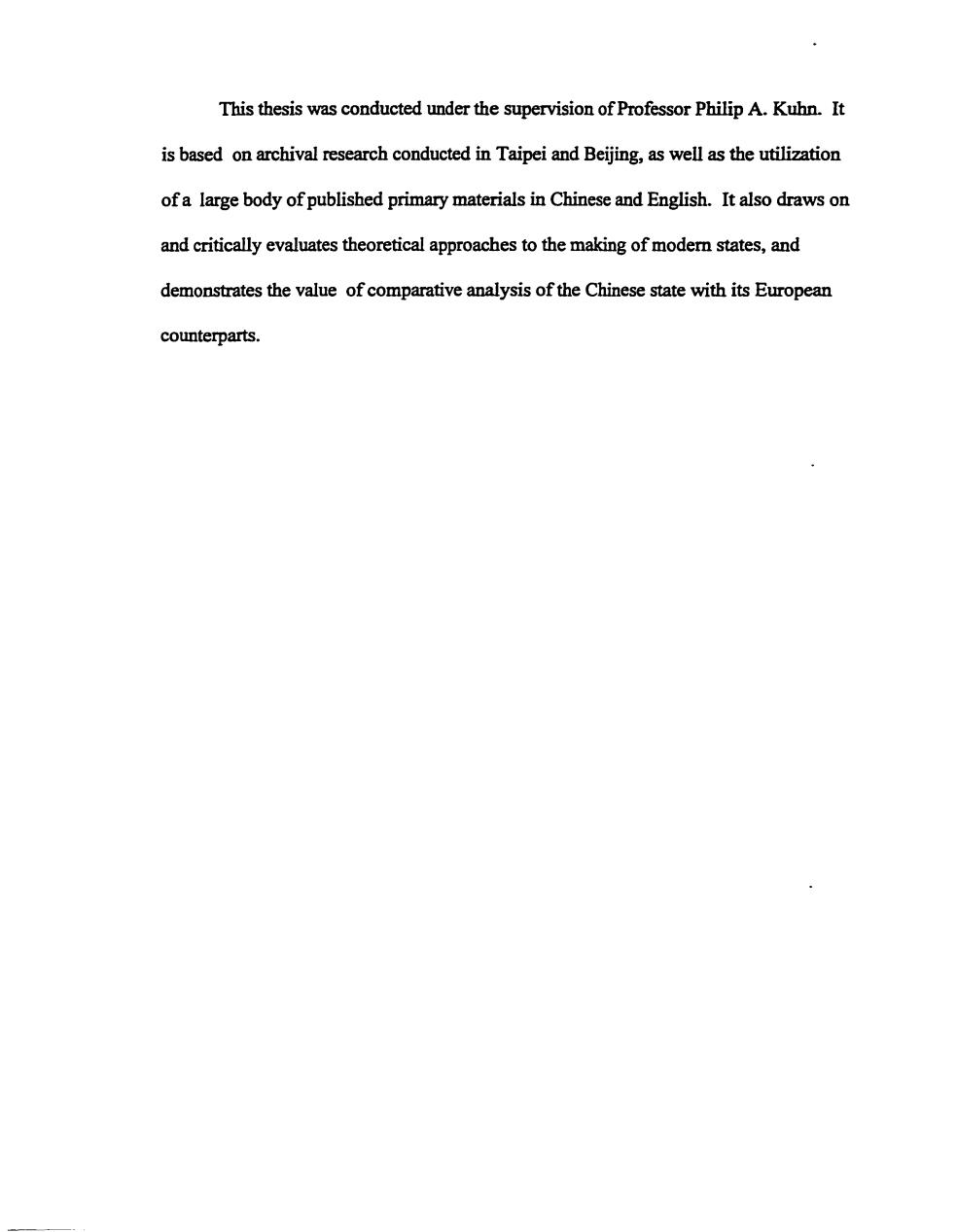
This thesis was conducted under the supervision of Professor Philip A.Kuhn.It is based on archival research conducted in Taipei and Beijing,as well as the utilization of a large body of published primary materials in Chinese and English.It also draws on and critically evaluates theoretical approaches to the making of modern states,and demonstrates the value of comparative analysis of the Chinese state with its European counterparts.
This thesis was conducted under the supervision of Professor Philip A. Kuhn. It is based on archival research conducted in Taipei and Beijing, as well as the utilization of a large body of published primary materials in Chinese and English. It also draws on and critically evaluates theoretical approaches to the making of modem states, and demonstrates the value of comparative analysis of the Chinese state with its European counterparts
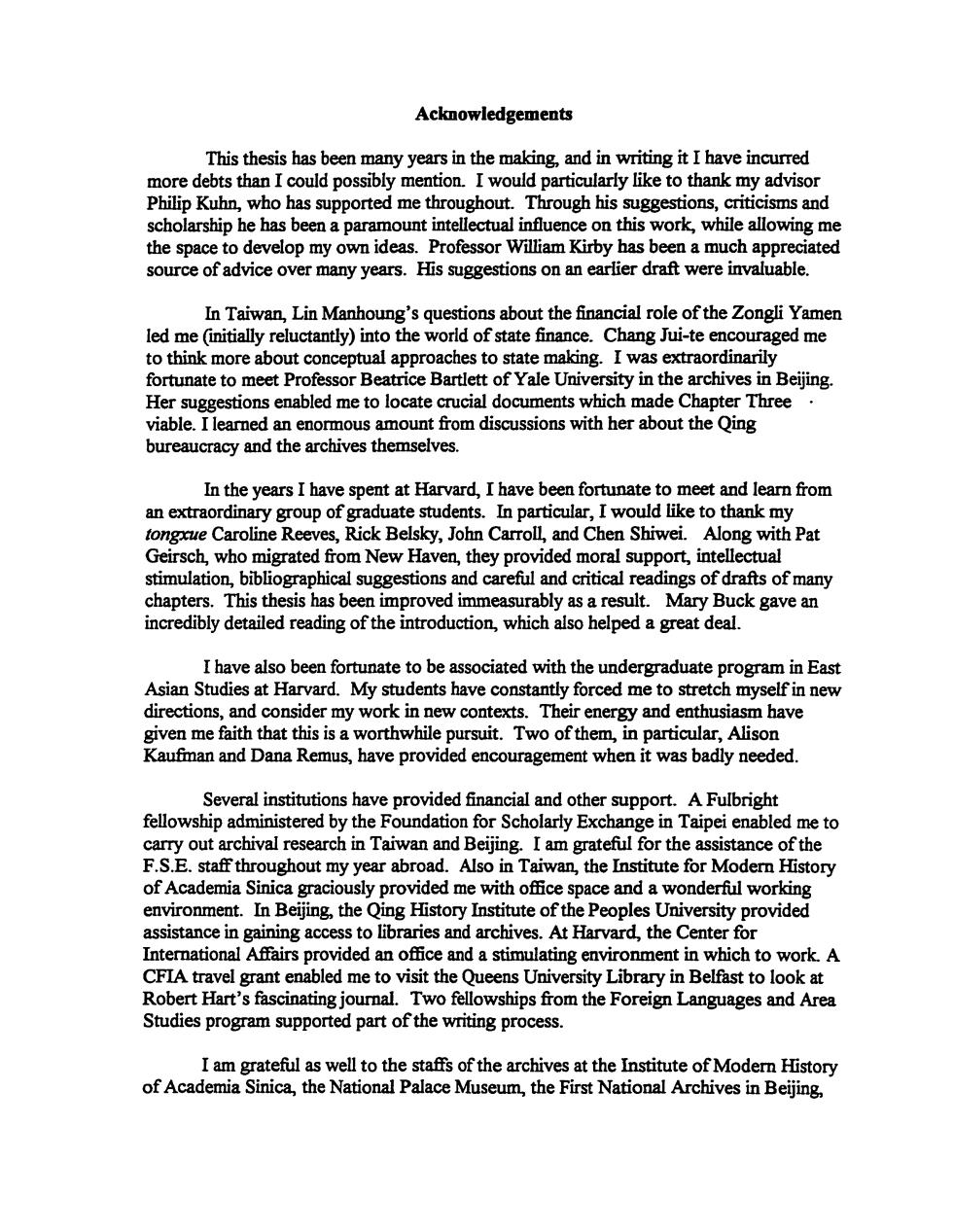
Acknowledgements This thesis has been many years in the making,and in writing it I have incurred more debts than I could possibly mention.I would particularly like to thank my advisor Philip Kuhn,who has supported me throughout.Through his suggestions,criticisms and scholarship he has been a paramount intellectual influence on this work,while allowing me the space to develop my own ideas.Professor William Kirby has been a much appreciated source of advice over many years.His suggestions on an earlier draft were invaluable In Taiwan,Lin Manhoung's questions about the financial role of the Zongli Yamen led me (initially reluctantly)into the world of state finance.Chang Jui-te encouraged me to think more about conceptual approaches to state making.I was extraordinarily fortunate to meet Professor Beatrice Bartlett of Yale University in the archives in Beijing. Her suggestions enabled me to locate crucial documents which made Chapter Three viable.I learned an enormous amount from discussions with her about the Qing bureaucracy and the archives themselves. In the years I have spent at Harvard,I have been fortunate to meet and learn from an extraordinary group of graduate students.In particular,I would like to thank my fongxue Caroline Reeves,Rick Belsky,John Carroll,and Chen Shiwei.Along with Pat Geirsch,who migrated from New Haven,they provided moral support,intellectual stimulation,bibliographical suggestions and careful and critical readings of drafts of many chapters.This thesis has been improved immeasurably as a result.Mary Buck gave an incredibly detailed reading of the introduction,which also helped a great deal. I have also been fortunate to be associated with the undergraduate program in East Asian Studies at Harvard.My students have constantly forced me to stretch myself in new directions,and consider my work in new contexts.Their energy and enthusiasm have given me faith that this is a worthwhile pursuit.Two of them,in particular,Alison Kaufman and Dana Remus,have provided encouragement when it was badly needed. Several institutions have provided financial and other support.A Fulbright fellowship administered by the Foundation for Scholarly Exchange in Taipei enabled me to carry out archival research in Taiwan and Beijing.I am grateful for the assistance of the F.S.E.staff throughout my year abroad.Also in Taiwan,the Institute for Modern History of Academia Sinica graciously provided me with office space and a wonderful working environment.In Beijing,the Qing History Institute of the Peoples University provided assistance in gaining access to libraries and archives.At Harvard,the Center for International Affairs provided an office and a stimulating environment in which to work.A CFIA travel grant enabled me to visit the Queens University Library in Belfast to look at Robert Hart's fascinating journal.Two fellowships from the Foreign Languages and Area Studies program supported part of the writing process. I am grateful as well to the staffs of the archives at the Institute of Modern History of Academia Sinica,the National Palace Museum,the First National Archives in Beijing
Acknowledgements This thesis has been many years in the making, and in writing it I have incurred more debts than I could possibly mention. I would particularly like to thank my advisor Philip K~ who has supported me throughout. Through his suggestions, criticisms and scholarship he has been a paramount intellectual influence on this work, while allowing me the space to develop my own ideas. Professor William Kirby has been a much appreciated source of advice over many years. His suggestions on an earlier draft were invaluable. In Taiwan, Lin Manhoung's questions about the financial role of the Zongli Yarnen led me (Initially reluctantly) into the world of state finance. Chang lui-te encouraged me to think more about conceptual approaches to state making. I was extraordinarily fortunate to meet Professor Beatrice Bartlett of Yale University in the archives in Beijing. Her suggestions enabled me to locate crucial documents which made Chapter Three viable. I learned an enormous amount from discussions with her about the Qing bureaucracy and the archives themselves. In the years I have spent at Harvard, I have been fortunate to meet and learn from an extraordinary group of graduate students. In particular, I would like to thank my tongxue Caroline Reeves, Rick Belsky, lohn Carroll, and Chen Shiwei. Along with Pat Geirsch, who migrated from New Haven, they provided moral support, intellectual stimulation, bibliographical suggestions and careful and critical readings of drafts of many chapters. This thesis has been improved immeasurably as a result. Mary Buck gave an incredibly detailed reading of the introduction, which also helped a great deal. I have also been fortunate to be associated with the undergraduate program in East Asian Studies at Harvard. My students have constantly forced me to stretch myself in new directions, and consider my work in new contexts. Their energy and enthusiasm have given me faith that this is a worthwhile pursuit. Two of them, in particular, Alison Kallfinan and Dana Remus, have provided encouragement when it was badly needed. Several institutions have provided financial and other support. A Fulbright fellowship administered by the Foundation for Scholarly Exchange in Taipei enabled me to carry out archival research in Taiwan and Beijing. I am grateful for the assistance of the F.S.E. staff throughout my year abroad. Also in Taiwan, the Institute for Modem History of Academia Sinica graciously provided me with office space and a wonderful working environment. In Beijing, the Qing History Institute of the Peoples University provided assistance in gaining access to horaries and archives. At Harvard, the Center for International Affairs provided an office and a stimulating environment in which to work. A CFIA travel grant enabled me to visit the Queens University Library in Belfast to look at Robert Hart's fascinatingjoumal. Two fellowships from the Foreign Languages and Area Studies program supported part of the writing process. I arn grateful as well to the staffs of the archives at the Institute of Modem History of Academia Sinica, the National Palace Museum, the First National Archives in Beijing
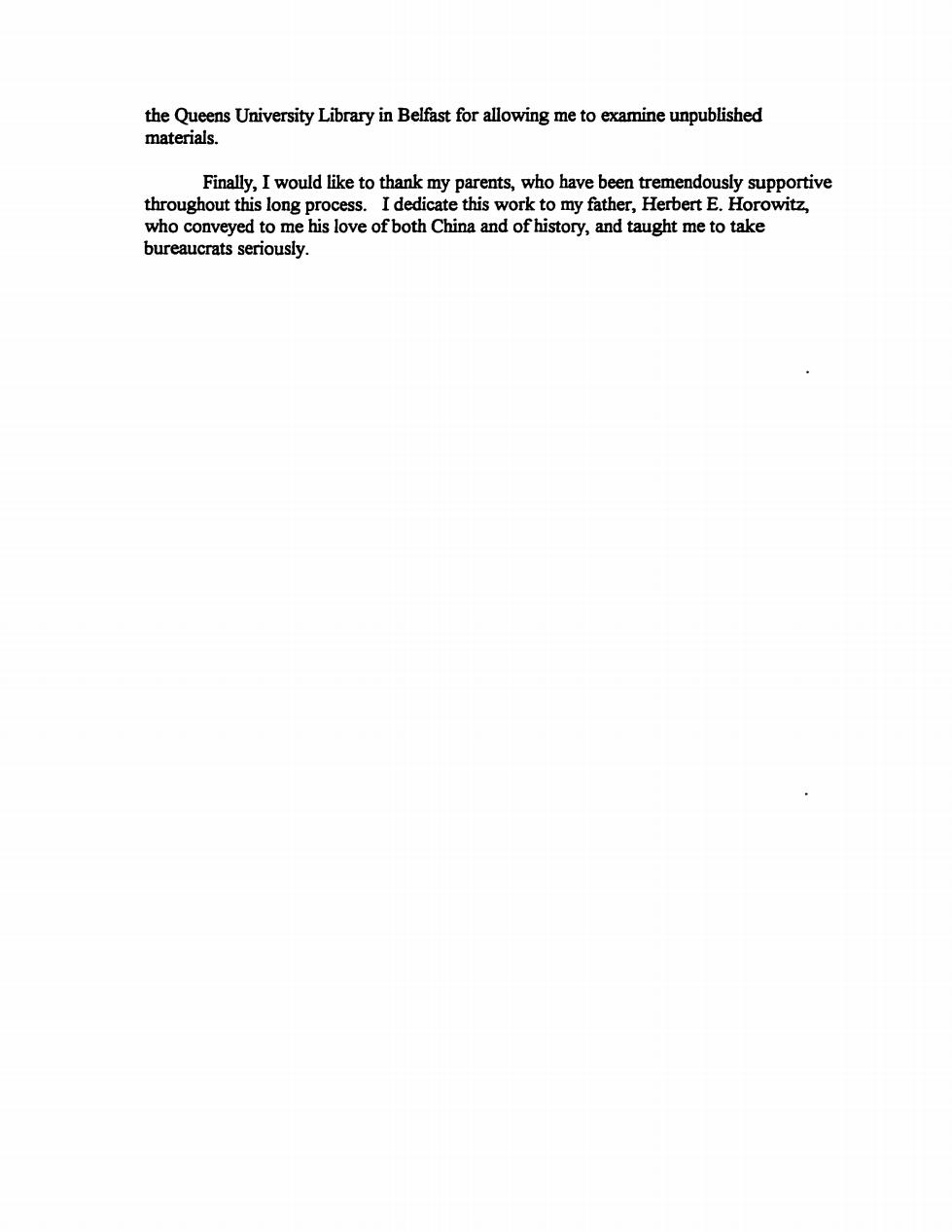
the Queens University Library in Belfast for allowing me to examine unpublished materials. Finally,I would like to thank my parents,who have been tremendously supportive throughout this long process.I dedicate this work to my father,Herbert E.Horowitz, who conveyed to me his love of both China and of history,and taught me to take bureaucrats seriously
the Queens University Library in Belfast for allowing me to examine unpublished materials. Finally, I would like to thank my parents, who have been tremendously supportive throughout this long process. I dedicate this work to my father, Herbert E. Horowitz, who conveyed to me his love of both China and of history, and taught me to take bureaucrats seriously
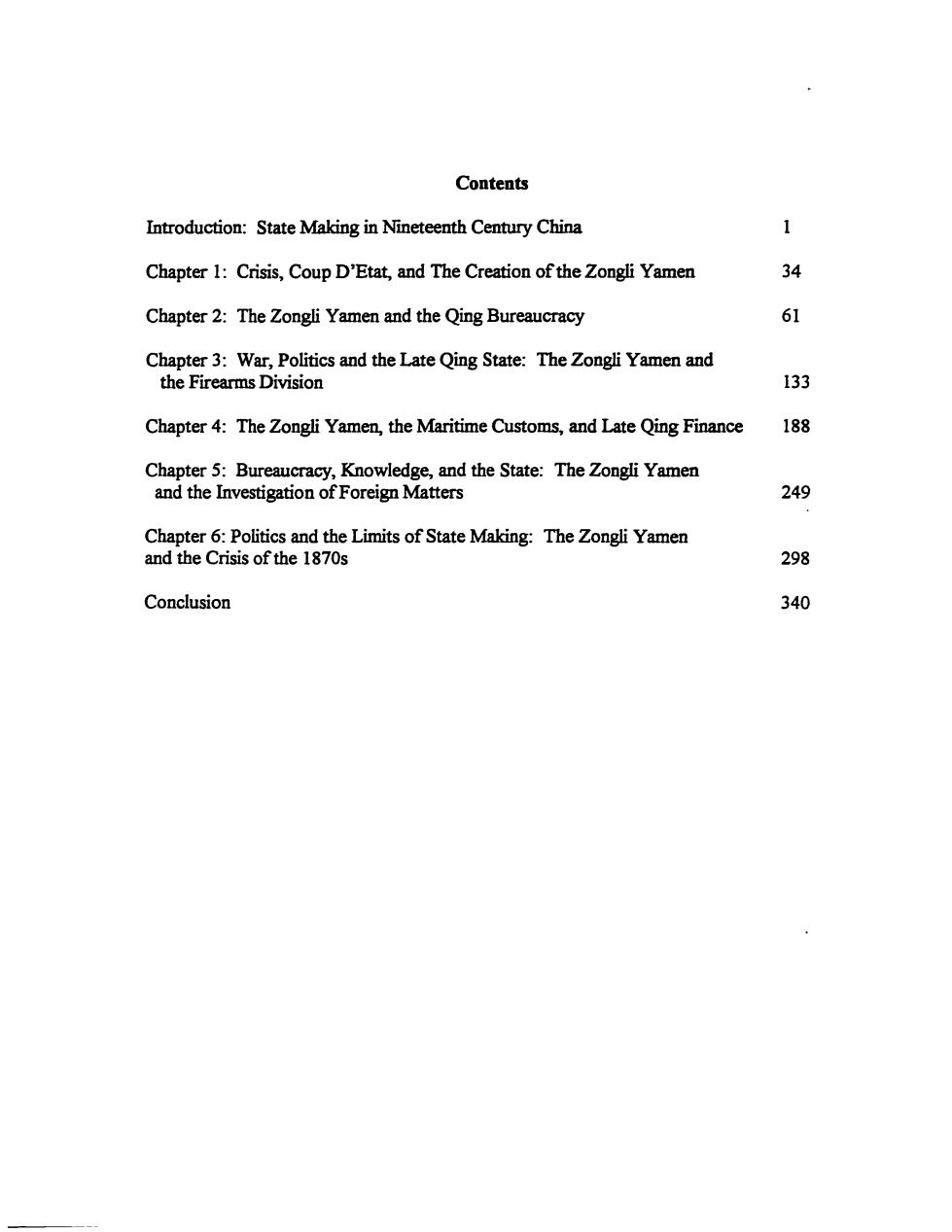
Contents Introduction:State Making in Nineteenth Century China 1 Chapter 1:Crisis,Coup D'Etat,and The Creation of the Zongli Yamen 34 Chapter 2:The Zongli Yamen and the Qing Bureaucracy 61 Chapter 3:War,Politics and the Late Qing State:The Zongli Yamen and the Firearms Division 133 Chapter 4:The Zongli Yamen,the Maritime Customs,and Late Qing Finance 188 Chapter 5:Bureaucracy,Knowledge,and the State:The Zongli Yamen and the Investigation of Foreign Matters 249 Chapter 6:Politics and the Limits of State Making:The Zongli Yamen and the Crisis of the 1870s 298 Conclusion 340
Contents Introduction: State Making in N'meteenth Century China 1 Chapter 1: Crisis, Coup D'Etat, and The Creation oftheZongli Yamen 34 Chapter 2: The Zongli Yamen and the Qing Bureaucracy 61 Chapter 3: War, Politics and the Late Qing State: The Zongli Yamen and the Firearms Division 13 3 Chapter 4: The Zongli Yamen, the Maritime Customs, and Late Qing Finance 188 Chapter 5: Bureaucracy, Knowledge, and the State: The Zongli Yamen and the Investigation of Foreign Matters 249 Chapter 6: Politics and the Limits of State Making: The Zongli Yamen and the Crisis of the 1870s 298 Conclusion 340
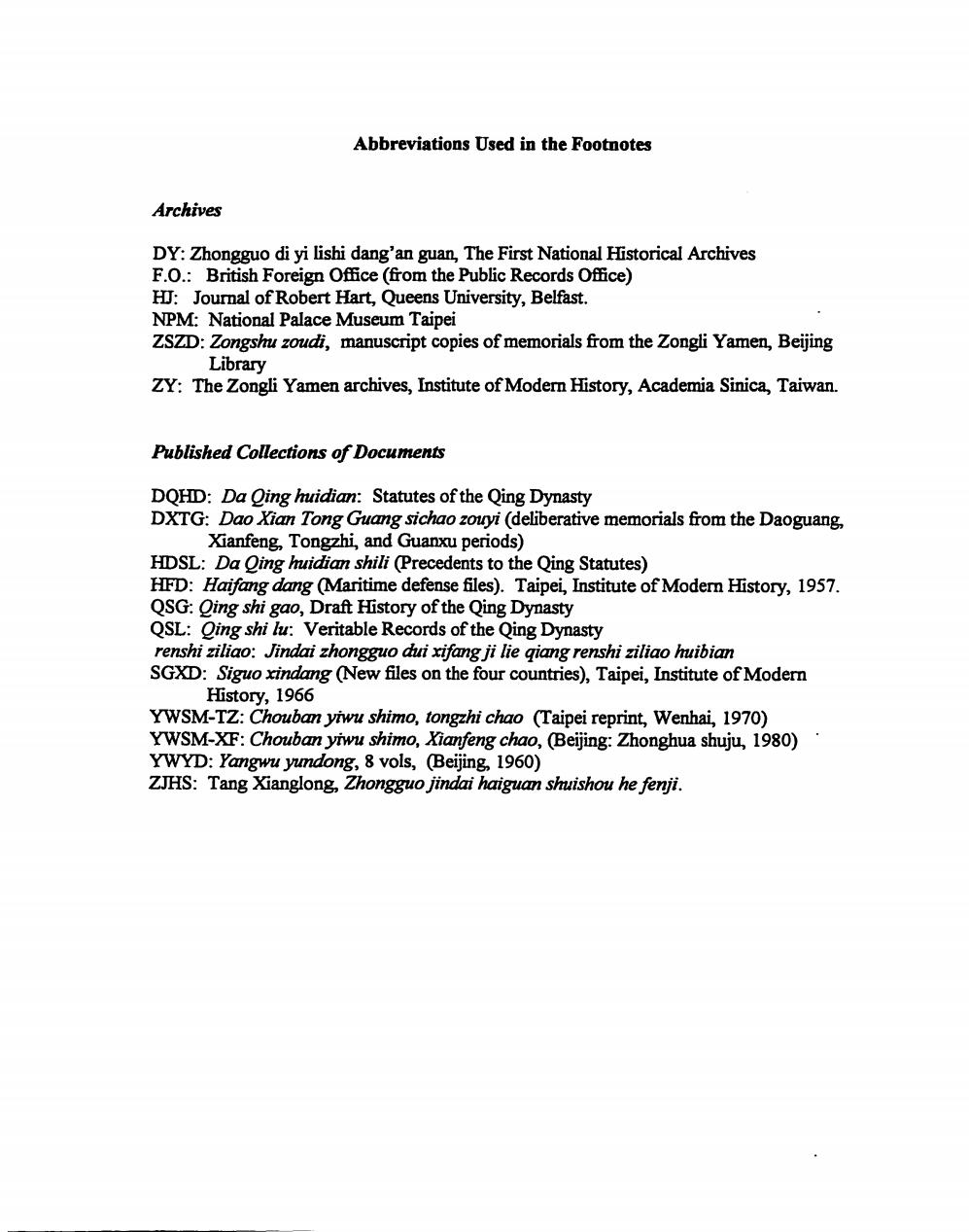
Abbreviations Used in the Footnotes Archives DY:Zhongguo di yi lishi dang'an guan,The First National Historical Archives F.O.:British Foreign Office (from the Public Records Office) HJ:Journal of Robert Hart,Queens University,Belfast. NPM:National Palace Museum Taipei ZSZD:Zongshu zoudi,manuscript copies of memorials from the Zongli Yamen,Beijing Library ZY:The Zongli Yamen archives,Institute of Modern History,Academia Sinica,Taiwan. Published Collections of Documents DQHD:Da Oing huidian:Statutes of the Qing Dynasty DXTG:Dao Xian Tong Guang sichao zouyi (deliberative memorials from the Daoguang, Xianfeng,Tongzhi,and Guanxu periods) HDSL:Da Oing huidian shili (Precedents to the Qing Statutes) HFD:Haifang dang (Maritime defense files).Taipei,Institute of Modern History,1957. QSG:Qing shi gao,Draft History of the Qing Dynasty QSL:Qing shi lu:Veritable Records of the Qing Dynasty renshi ziliao:Jindai zhongguo dui xifang ji lie qiang renshi ziliao huibian SGXD:Siguo xindang (New files on the four countries),Taipei,Institute of Modern History,1966 YWSM-TZ:Chouban yiwu shimo,tongzhi chao (Taipei reprint,Wenhai,1970) YWSM-XF:Chouban yiwu shimo,Xianfeng chao,(Beijing:Zhonghua shuju,1980) YWYD:Yangwu yundong,8 vols,(Beijing,1960) ZJHS:Tang Xianglong,Zhongguo jindai haiguan shuishou he fenji
Abbreviations Used in the Footnotes Archives DY: Zhongguo di yi Iishi dang'an guan, The First National Historical Archives F.O.: British Foreign Office (from the Public Records Office) IU: Journal of Robert Hart, Queens University, Belfast. NPM: National Palace Museum Taipei ZSZD: Zongshu zoudi, manuscript copies of memorials from the Zongli Yamen, Beijing Library Z¥: The Zongli Yamen archives, Institute of Modem History, Academia Sinica, Taiwan. Published CoUections of Documents DQHD: Da Qing huidian: Statutes of the Qing Dynasty DXTG: Dao Xian Tong Guang sichao zouyi (dehoerative memorials from the Daoguang, Xianfeng, Ton~ and Guanxu periods) HDSL: Da Qing huidian shili (precedents to the Qing Statutes) HFD: Haijangdang(Maritime defense files). Taipe~ Institute of Modem History, 1957. QSG: Qing shi gao, Draft History of the Qing Dynasty QSL: Qing shi lu: Veritable Records of the Qing Dynasty renshi ziliao: Jindai zhongguo dui xiJangji lie qiang renshi ziliao huihian SGXO: Siguo rindang (New files on the four countries), Taipei, Institute of Modem History, 1966 YWSM-TZ: Chouhan yiwu shimo, tongzhi chao (Taipei reprint, We. 1970) YWSM-XF: Chouhanyiwu shimo, Xianfengchao, (Beijing: Zhonghua shuju, 1980) YWYD: Yangwu yundong, 8 vols, (Beijing, 1960) ZJHS: Tang Xianglong, Zhongguo jindai haiguan shuishou he fenji

Introduction: State Making in Nineteenth Century China In the winter of 1874-5,the veteran Manchu statesman Wenxiang(1818-1876) submitted to the throne a remarkable memorial.As the leading member of the Zongli Yamen,the bureau of foreign affairs for the preceding thirteen years,Wenxiang had attempted to direct the Qing Dynasty toward a more peaceful and productive foreign policy,and to press for a program of self-strengthening.But now,seriously ill with respiratory disease,he found little to be proud of.His government had been battling internal rebellions for twenty-five years,but fighting continued in the Northwest,and now China faced a host of foreign antagonists.Britain,France,Russia and even Japan eyed the Qing dominions hungrily.As the recent crisis with Japan concerning sovereignty over Taiwan showed,the challenge they posed could not be avoided for long. Casting a cold eye on those who denied that China had anything of substance to learn from foreigners,Wenxiang remarked: There are those who say that the nature of the western countries is like dogs and sheep,and they do not know about government.But in these countries when there is a matter that calls for action,the ruler sends it to the upper house of parliament for deliberation,that is what is meant by 'consulting with the officials and scholars;'he [also]sends it to the lower house of parliament,that is what is meant by'consulting with the common people.What is deliberated upon and can be done is then implemented;if not,then it is stopped.Everything must be in accord with the feelings of the people ...These countries govern themselves by means of these principles and they regard the rising and falling and successes and failures of other countries by these [criteria]. The quotations are from the canonical Book ofDocumens V,iv.See James Legge,The Chinese Classics,(Hong Kong:Hong Kong University Press,1960),vol.3,337
Introduction: State Making in Nineteenth Century China In the winter of 1874-5, the veteran Manchu statesman Wenxiang (1818-18~6) submitted to the throne a remarkable memorial. As the leading member of the Zongli Yamen, the bureau of foreign affairs for the preceding thirteen years, Wenxiang had attempted to direct the Qing Dynasty toward a more peaceful and productive foreign policy, and to press for a program of self-strengthening. But now, seriously ill with respiratory disease, he found little to be proud of. His government had been battling internal rebellions for twenty-five years, but fighting continued in the Northwest, and now China faced a host of foreign antagonists. Britain, France, Russia and even Japan eyed the Qing dominions hungrily. As the recent crisis with Japan concerning sovereignty over Taiwan showed, the challenge they posed could not be avoided for long. Casting a cold eye on those who denied that China had anything of substance to learn from foreigners, Wenxiang remarked: There are those who say that the nature of the western countries is like dogs and sheep, and they do not know about government. But in these countries when there is a matter that calIs for action, the ruler sends it to the upper house of parliament for deliberation, that is what is meant by 'consulting with the officials and scholars;' he [also] sends it to the lower house of parliament, that is what is meant by 'consulting with the common people.' I What is deliberated upon and can be done is then implemented; if not, then it is stopped. Everything must be in accord with the feelings of the people ... These countries govern themselves by means of these principles and they regard the rising and falling and successes and failures of other countries by these [criteria]. I The quotations are from the canonical Book a/Documents V, iv. See James Legge, The . Chinese Classics, (Hong Kong: Hong Kong University Press, 1960), vol. 3, 337
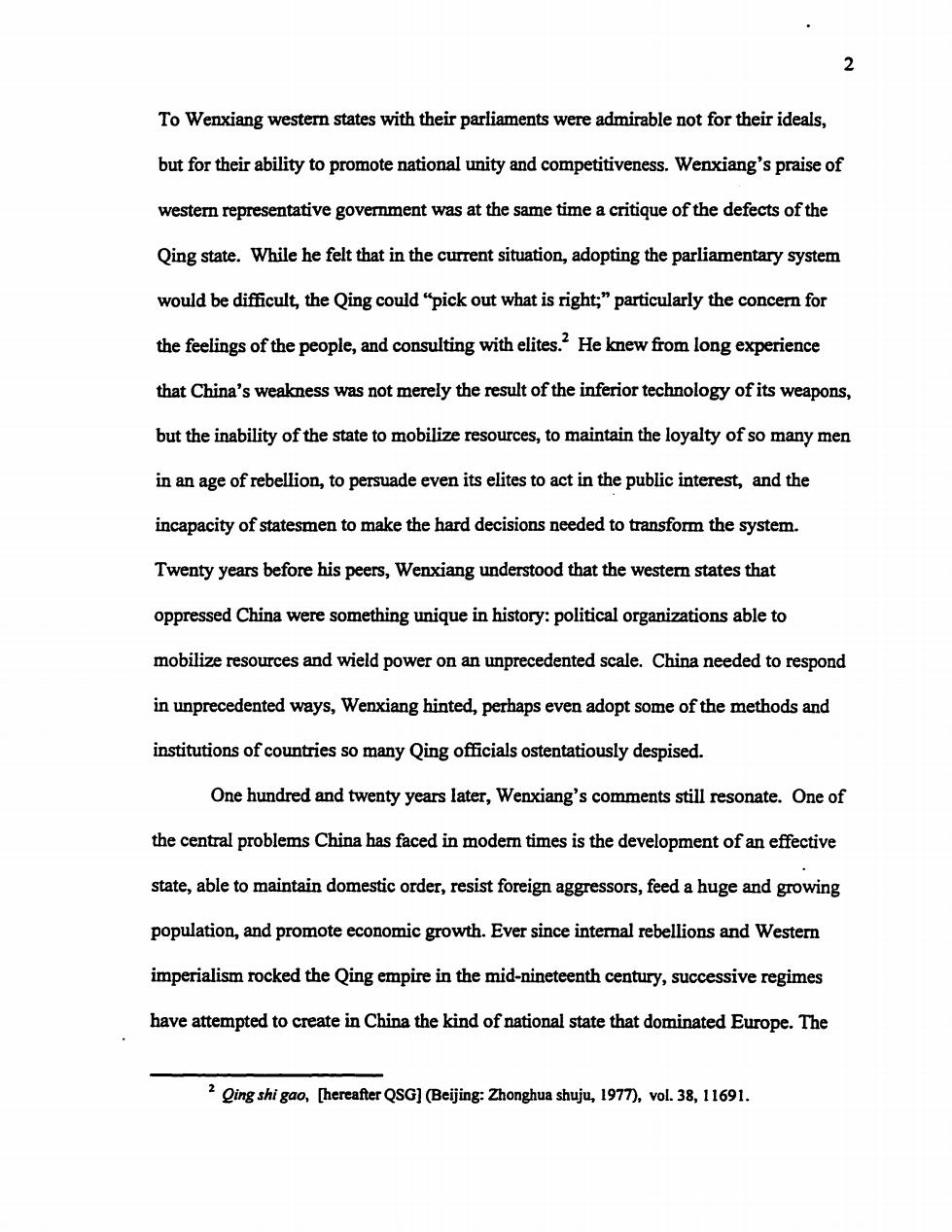
To Wenxiang western states with their parliaments were admirable not for their ideals, but for their ability to promote national unity and competitiveness.Wenxiang's praise of western representative government was at the same time a critique of the defects of the Qing state.While he felt that in the current situation,adopting the parliamentary system would be difficult,the Qing could"pick out what is right;"particularly the concern for the feelings of the people,and consulting with elites.He knew from long experience that China's weakness was not merely the result of the inferior technology of its weapons, but the inability of the state to mobilize resources,to maintain the loyalty of so many men in an age of rebellion,to persuade even its elites to act in the public interest,and the incapacity of statesmen to make the hard decisions needed to transform the system. Twenty years before his peers,Wenxiang understood that the western states that oppressed China were something unique in history:political organizations able to mobilize resources and wield power on an unprecedented scale.China needed to respond in unprecedented ways,Wenxiang hinted,perhaps even adopt some of the methods and institutions of countries so many Qing officials ostentatiously despised. One hundred and twenty years later,Wenxiang's comments still resonate.One of the central problems China has faced in modern times is the development of an effective state,able to maintain domestic order,resist foreign aggressors,feed a huge and growing population,and promote economic growth.Ever since internal rebellions and Western imperialism rocked the Qing empire in the mid-nineteenth century,successive regimes have attempted to create in China the kind of national state that dominated Europe.The Qing shi gao,[hereafter QSG](Beijing:Zhonghua shuju,1977),vol.38,11691
2 To Wenxiang western states with their parliaments were admirable not for their ideals, but for their ability to promote national unity and competitiveness. Wenxiang's praise of western representative government was at the same time a critique of the defects of the Qing state. While he felt that in the current situation, adopting the parliamentary system would be difficult, the Qing could '1>ick out what is right;" particularly the concern for the feelings of the people, and consulting with elites.2 He knew from long experience that China's weakness was not merely the result of the inferior technology of its weapons, but the inability of the state to mobilize resources, to maintain the loyalty of so many men in an age of rebellion, to persuade even its elites to act in the public interest, and the incapacity of statesmen to make the hard decisions needed to transform the system. Twenty years before his peers, Wenxiang understood that the western states that oppressed China were something unique in history: political organizations able to mobilize resources and wield power on an unprecedented scale. China needed to respond in unprecedented ways, Wenxiang hinted, perhaps even adopt some of the methods and institutions of countries so many Qing officials ostentatiously despised. One hundred and twenty years later, Wenxiang's comments still resonate. One of the central problems China has faced in modem times is the development of an effective state, able to maintain domestic order, resist foreign aggressors, feed a huge and growing population, and promote economic growth. Ever since internal rebellions and Western imperialism rocked the Qing empire in the mid-nineteenth century, successive regimes have attempted to create in China the kind of national state that dominated Europe. The 2 Qing shi gao, [hereafter QSG] (Beijing: Zhonghua shuju, 1977), vol. 38, 11691
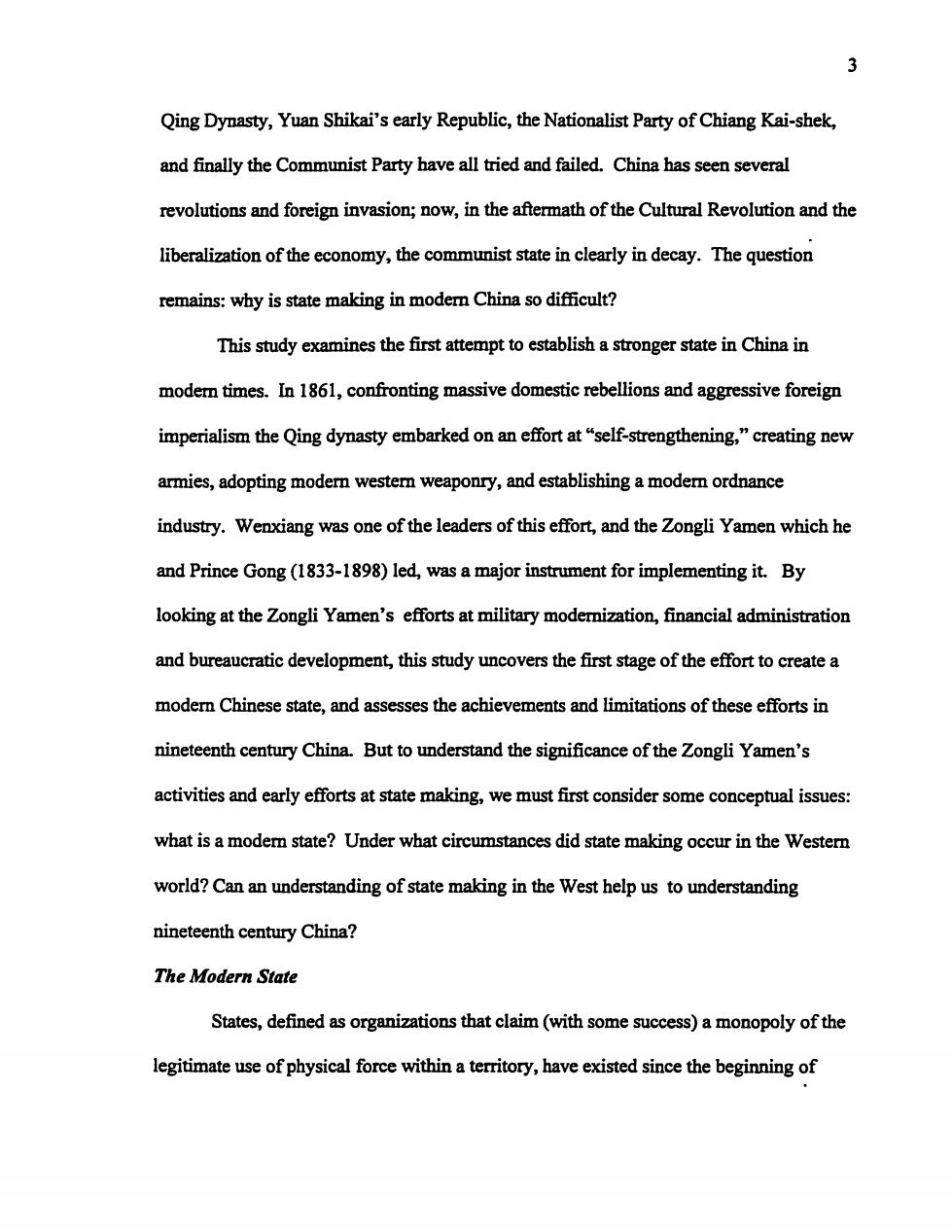
3 Qing Dynasty,Yuan Shikai's early Republic,the Nationalist Party of Chiang Kai-shek, and finally the Communist Party have all tried and failed.China has seen several revolutions and foreign invasion;now,in the aftermath of the Cultural Revolution and the liberalization of the economy,the communist state in clearly in decay.The question remains:why is state making in modern China so difficult? This study examines the first attempt to establish a stronger state in China in modemn times.In 1861,confronting massive domestic rebellions and aggressive foreign imperialism the Qing dynasty embarked on an effort at"self-strengthening,"creating new armies,adopting modern western weaponry,and establishing a modern ordnance industry.Wenxiang was one of the leaders of this effort,and the Zongli Yamen which he and Prince Gong(1833-1898)led,was a major instrument for implementing it.By looking at the Zongli Yamen's efforts at military modernization,financial administration and bureaucratic development,this study uncovers the first stage of the effort to create a modern Chinese state,and assesses the achievements and limitations of these efforts in nineteenth century China.But to understand the significance of the Zongli Yamen's activities and early efforts at state making,we must first consider some conceptual issues: what is a modern state?Under what circumstances did state making occur in the Western world?Can an understanding of state making in the West help us to understanding nineteenth century China? The Modern State States,defined as organizations that claim (with some success)a monopoly of the legitimate use of physical force within a territory,have existed since the beginning of
3 Qing Dynasty, Yuan Shikai's early Republic, the Nationalist Party of Chiang Kai-shek, and finally the Communist Party have all tried and failed. China has seen several revolutions and foreign invasion; now, in the aftermath of the Cultural Revolution and the . liberalization of the economy,. the communist state in clearly in decay. The question remains: why is state making in modem China so difficult? This study examines the first attempt to establish a stronger state in China in modem times. In 1861,. confronting massive domestic rebellions and aggressive foreign imperialism the Qing dynasty embarked on an effort at "self-strengthening," creating new armies, adopting modem western weaponry, and establishing a modem ordnance industry. Wenxiang was one of the leaders of this effort, and the Zongli Yamen which he and Prince Gong (1833-1898) led, was a major instrument for implementing it. By looking at the Zongli Yamen's efforts at military modernization, financial administration and bureaucratic development,. this study uncovers the first stage of the effort to create a modem Chinese state, and assesses the achievements and limitations of these efforts in nineteenth century China. But to understand the significance of the Zongli Yamen's activities and early efforts at state making, we must first consider some conceptual issues: what is a modem state? Under what circumstances did state making occur in the Western world? Can an understanding of state making in the West help us to understanding nineteenth century China? The Modem State States, defined as organizations that claim (with some success) a monopoly of the legitimate use ofphysica1 force within a territory, have existed since the beginning of